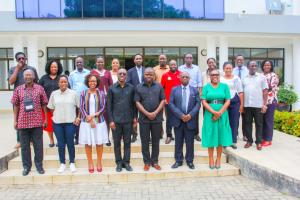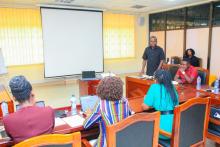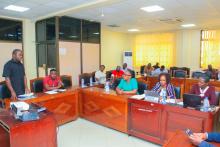WHO supports development of tools to enhance responders’ capacities for risk communication and community engagement
Dar es Salaam- Risk Communication and Community Engagement (RCCE) forms an integral pillar of public health emergency response by playing a significant role in engaging affected and at-risk communities to prevent, detect and respond to health emergencies.
However, the concept of RCCE sounds new to many practitioners globally limiting local capacities to effectively implement social-behavioral interventions against public health emergencies.
In December 2023, a training need assessment was conducted which has indicated that only 42 out of 197 (21.3 %) respondents had received any form of health promotion or risk communication training across the country. Over 80% of the district health promotion coordinators and close to 60% of the regional health promotion coordinators (58%) had not received the training and over 90% of the others as a category had not received any RCEE related training.
With financial support from the World Health Organization (WHO), and in collaboration with the Ministry of Health, the Muhimbili University of Allied and Health Sciences (MUHAS) was commissioned to enhance relevant mechanisms and systems for effective provision of timely lifesaving information during public health emergencies.
The support included developing the RCCE readiness and crisis communication tool kits as well as training curriculum which will be utilized by training and guiding RCCE personnel across all levels to effectively implement relevant interventions tailored to build community protection and resilience against public health threats.
According to Dr Faraja Msemwa, the Emergency and Outbreak officer at WHO, the country has made major achievements in the implementation of the International Health Regulations (IHR) core capacities as indicated in the States Parties Self-Assessment Annual Report (SPAR) and Joint External Evaluation (JEE) assessments.
She noted that, these are evidenced by the establishment of major systems and mechanisms that enhance readiness and response to public health emergencies such as establishment of PHEOCs and trained SURGE personnel amongst others.
However, “there is a need for a joint effort to continually support the member states to implement the (IHR) core capacities to enhance readiness and response to public health threats. Said Dr Msemwa. “Despite these achievements, there are notable gaps that need to be worked on jointly for more improvement including development of relevant tools for specific technical areas such as RCCE”.
For Ms. Catherine Gitige, the RCCE focal person from the Ministry of Health-Health Promotion Section, she expressed her gratitude for the support from WHO to the development of the RCCE tools which are a cornerstone in building local capacities to enhance community protection.
“This tool will not have come at any better time as we are confronted with so many health outbreaks. We are very grateful to the WHO to support the development of the RCCE tools. Once endorsed, institutionalized and disseminated, these tools will play a significant role in building the capacities of the RCCE personnel across all levels and enhance RCCE interventions as an avenue to build community protection against public health emergencies”, said Ms. Gitige
After efficient training and institutionalization, it’s expected to close the limiting gap of existing RCCE personnel to effectively articulate the implementation of IHR core capacities-RCCE key indicators.
One of the participants, Mariam Agbe echoed her sentiments regarding the RCCE tools, highlighting the positive impact these tools will bring towards building community protection.
“For many years now, many of us in the regions and districts were implementing RCCE intervention with very low skills and knowledge. With these tools in place, we are confidently sure that RCCE interventions are going to be enhanced across all levels to build community protection and resilience”, she noted.
The validation meeting gathered experts from Ministry of Health, MUHAS, representatives of regional health promotion, coordinators and RCCE partners including UNICEF.
Communications Officer
WHO Country Office, United Republic of Tanzania
Tel: +255 744377899 (Phone)
Email: adjeidum [at] who.int (adjeidum[at]who[dot]int)
Email: kileon [at] who.int (kileon[at]who[dot]int)
Tel: +255 755 551 804


